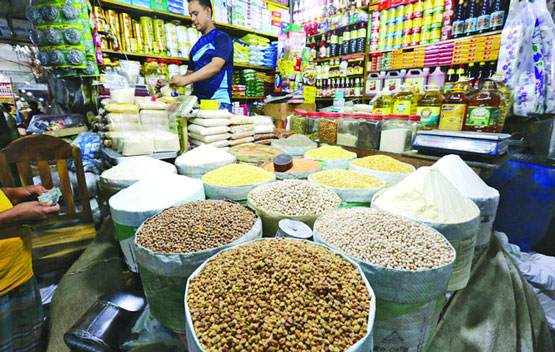Cut taxes to control price hike
Major trade bodies urge to govt
Staff Correspondent: Multiple think-tanks and major trade bodies on Tuesday urged the government to reduce taxes and duties on their essential and other relevant commodities to control price hikes during inflation.
The organizations, including the Centre for Policy Dialogue (CPD), the Bangladesh Economic Association (BEA), Bangladesh Garment Manufacturers and Exporters Association (BGMEA), Bangladesh Knitwear Manufacturers and Exporters Association (BKMEA) and Bangladesh Textile Mills Association (BTMA), met with the National Board of Revenue (NBR) officials at the latter’s office to submit their respective pre-budget proposals for FY24.
In their pre-budget proposal, the CPD said that although duties and taxes on sugar were reduced recently, their analysis showed that at least 28 imported essential food items still faced high taxes.
In the FY23 budget, the personal income tax structure remained unchanged from the one introduced in the FY22 budget.
CPD argued that reducing the highest tax rate (from 30% to 25%) was against the cause of promoting tax justice.
The tax-free income threshold for personal income should be raised to Tk3.50 lakh considering the added pressure of rising commodity prices, particularly those of food items, said the CPD.
Alternatively, the second slab for personal income tax which is 5% for an additional Tk1 lakh should be increased to Tk3 lakh to provide a cushion to limited-income earners.
In the current budget, the rate of investment tax rebate has been fixed at 15% on the eligible amount.
This means that higher taxpayers, or top earners, get higher tax rebate benefits whereas those with annual income below Tk15 lakh will not get any additional tax benefits.
The withdrawal of this provision needs to be considered in the FY24 budget, said the think-tank.
Apparel exporters insisted on bringing down tax deducted at source and withdrawing income tax levied on cash incentives in the upcoming fiscal to help the readymade garment (RMG) industry deal with the current economic stress.
The apparel industry is losing competitiveness because of global higher inflation, a hike of the prices of yarn, chemicals, fuels, gas, and electricity, and a spike in container freight costs, it said.
According to one of the proposals, the tax deducted at source should be slashed to 0.5% from 1% in FY24.
The reduced rate should be continued for five years.
The association asked the NBR to apply the current corporate tax rate during the assessment of dis-allowable expenses and other incomes.
Currently, the government has imposed a 12% corporate tax on garment industries and 10% on green garment factories.
But during the assessment, the corporate tax rate applicable for private limited companies is imposed in the case of various incomes such as gains from asset disposal and dis-allowable expenses.
The BGMEA suggested cutting the tax deducted at source from 3% to 0.5%, from 5% to 2%, and from 7% to 3% for subcontractors.
BKMEA for continued corporate tax rate
The BKMEA urged the government to continue the existing corporate tax rate for another five years.
The government should continue the 12% corporate tax for garment industries and 10% for green garment factories for the five fiscal years.
The association demanded the removal of all duties imposed on the imports of solar panels and solar inverters with a capacity of more than 10 kilowatts, to popularize renewable energies.
It recommended zero duty and VAT on the import of chemicals needed to set up effluent treatment plants.
BTMA wants no VAT on raw materials
The BTMA requested the NBR to remove the VAT slapped on the collection of raw materials by deemed exporters to produce recycled fibres and later during the sales of the item to local millers.
It proposed VAT exemption on the fabrics manufactured from artificial fibre by power looms.
The BTMA said the provision of a 3% to 5% advance income tax levied on the import of machinery should be abolished.
BEA for reducing inequality
The Bangladesh Economic Association (BEA) in its proposal said that poverty has increased multi-dimensionally and this would widen further. At the same time, the labour market has been squeezed.
“There is no alternative to creating decent jobs on a large scale to overcome the situation,” said Prof Md Aynul Islam, general secretary of the BEA.
The BEA recommended imposing a wealth tax, raising the tax rate for the super-rich, levying wealth tax on large investments in share and bond markets, and imposing additional taxes on excess profits.
Rare Israeli airstrike in Beirut kills Hezbollah commander and more than a dozen others
International Desk: Israel launched a rare airstrike that killed a senior Hezbollah milita…








